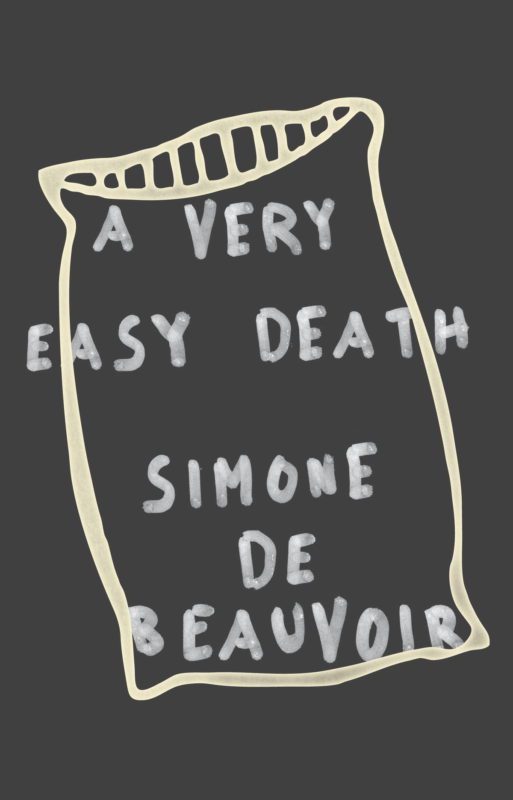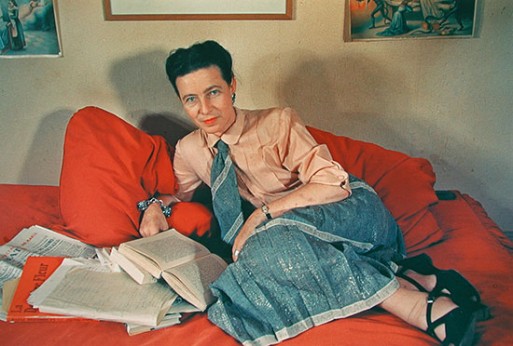 The most remarkable thing about Simone de Beauvoir’s A Very Easy Death (1964) is its author’s deft choice to seek the ordinary. Beauvoir’s is not a story we haven’t heard before — mother is diagnosed with cancer; children struggle by her side during the treatments and surgeries until, six weeks later, she dies. It’s the delicate restraint of Beauvoir’s narration – its conscious ability to explore the more ‘banal’ moments of terminal illnesses and the dying process – that sets it apart. There’s also something to be said about the relationship between the narrator, her mother and the bevy of medical professionals who start slowing filling up their lives. A Very Easy Death was written long before palliative care, death midwifery and the importance of the doctor-patient relationship during the dying process were being explored.
The most remarkable thing about Simone de Beauvoir’s A Very Easy Death (1964) is its author’s deft choice to seek the ordinary. Beauvoir’s is not a story we haven’t heard before — mother is diagnosed with cancer; children struggle by her side during the treatments and surgeries until, six weeks later, she dies. It’s the delicate restraint of Beauvoir’s narration – its conscious ability to explore the more ‘banal’ moments of terminal illnesses and the dying process – that sets it apart. There’s also something to be said about the relationship between the narrator, her mother and the bevy of medical professionals who start slowing filling up their lives. A Very Easy Death was written long before palliative care, death midwifery and the importance of the doctor-patient relationship during the dying process were being explored.
Consider this excerpt, in which Beauvoir’s narrator and sister, Poupette, contemplate the doctor’s character:
I repeated what Dr. B had said. She told me that since the beginning of the morning a resuscitation expert, Dr. N, had been working on Maman: he was going to put a tube into her nose to clean out her stomach. “But what’s the good of tormenting her, if she is dying? Let her die in peace,” said Poupette, in tears…Dr. N passed by me; I stopped him. White coat, white cap: a young man with an unresponsive face.
This is exactly the kind of cold end-of-life care that Dartmouth’s Ira Byock, M.D. is trying to evolve away from in end-of-life care. A few months earlier, SevenPonds reviewed his book on the matter titled The Best Care Possible. In it, Byock advocates for a more personalized and tactful doctor-patient relationship:
When I was growing up in the 1950s and 1960s, if a doctor said, “Your father is dying,” it was like nature itself had spoken. When a doctor says a patient must run tests as soon as possible, he is also inadvertently bringing their personal life to a screeching halt. Physicians need to take the time – and receive the training – to utilize a careful blend of empathy and professionalism in their communication with patients.
The doctors in A Very Easy Death are so impersonal that they’re reduced to letters. And in a sly prepositional touch, Dr. N is described as “working on” Beauvoir’s mother instead of “working with” her. The dying process is not going to be made more comforting by these figures, and the Beauvoir sisters are stuck wondering why their mother has to suffer so much to stay on the hinges of life – because that’s certainly not living.
Simone de Beauvoir was born in Paris in 1908 and died there in 1986 while she in between carved a place for herself amongst every other great philosopher and writer on the Parisian scene. The questions she raises in A Very Easy Death on dying, existence and the suffering in-between are thus right at home with her previous existentialist writings. The only difference is that Beauvoir is characterizing her own mother. Somehow, she does so with both grace and honesty — an honesty that doesn’t grow antagonistic because it depends on the detailed observation of objects and real-time action (as well as chapters more concerned with the past). We see Beauvoir go through the motions of buying new, loose clothes for her mother. We listen to her describe how the folds of her mouth move differently. In many ways, the novella feels like a cousin of the 2012 film, Amour, which chronicles a senior woman’s dying process with equal attentiveness.
A Very Easy Death is definitely worth a read if you’re interested in nonfiction that touches on mid-century end-of-life care. But it’s also worth reading if you like philosophy. It’s worth a read if you like examining culture, familial relationships, social norms – in short, it’s worth a read if you’re a human.
You may enjoy:
-
A Moveable Feast by Ernest Hemingway: Revisit Hemingway’s classic to contemplate how the deaths of WWI hovered over Paris’ “roaring” years.
- Pierre Bergé and a Life in Objects: Bergé’s partner, Yves Saint Laurent, died from a terminal illness in 2008 — but Bergé says it wasn’t just a disease that made his life cancerous
- The Catacombs of Paris: Unique Burial Site of Ancient France

 A Very Easy Death by Simone de Beauvoir
A Very Easy Death by Simone de Beauvoir



 Funeral Home Owner Chris Johnson Spending Halloween in Jail
Funeral Home Owner Chris Johnson Spending Halloween in Jail
 Our Monthly Tip: Toast a Loved One with a Personalized Glass
Our Monthly Tip: Toast a Loved One with a Personalized Glass
 My Cousin’s Death Taught Me the Meaning of Life
My Cousin’s Death Taught Me the Meaning of Life















A Very Easy Death is a worthwhile read for its resolutely frank depiction of death unmarred by the least sentimentality. Even today in this country we observe the superstition of saying a person has “passed” rather than died. After my father died I said so to an acquaintance who corrected me, no, he passed away, the man informed me. I find it a strange euphemism, and not at all consoling. Death is a fact that escapes the grieving least of all.
The irony in Simone de Beauvoir’s account is that neither she nor her sister had the courage to be frank with their mother about the plain fact of her impending death. They shooed away the priests and friends who would have been honest with her, and even in her last moments of life when she could no longer take a breath, kept reassuring her she was recuperating nicely. They rationalized that this was what she wanted to hear; they had a duty to tell her what she needed to know.
Report this comment